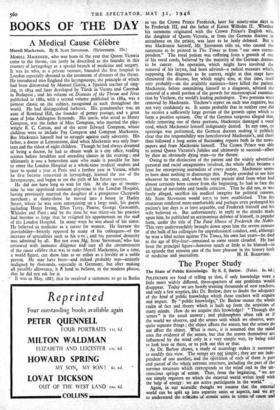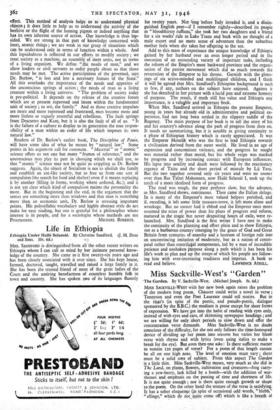The Proper Study
The State of Public Knowledge. By K. E Barlow. (Faber. 8s. 6d.)
PouriciAtIs are fond of telling us that, if only knowledge were a little more widely diffused, three-quarters of our problems would disappear. Today we are hastily training thousands of new teachers, and only a few sceptics, like Dr. Barlow, dare to doubt the adequacy of the kind of public knowledge which these teachers will acquire and impart. By "public knowledge'" Dr. Barlow means the whole realm of fact and .theory which is built up from the activities of many minds. How do we acquire this knowledge? "Through the senses" is the usual answer ; and philosophers often talk as if the world we observe, and the senses with which we observe, were quite separate things ; the object affects the senses, but the senses do not affect the object. What is more, it is assumed that the mind uses the evidence of the senses, but that the senses themselves are influenced by the mind only in a very simple way, by being told to look here or there, or to pick out this or that.
As Dr. Barlow shows, a study of neurology makes it necessary to modify this view. The senses are not simple ; they are not inde- pendent of one another, and the oration of each of them is part and parcel of the whole nervous structure, including the part of the nervous structure which corresponds to the mind and to the un- conscious springs of action. Thus, from the beginning, "we are not simply registers on which the external world writes itself with the help of energy: we are active participants in the world." • Again, in our scientific thought we assume that the external world can be split up into separate units or aspects, and we try to understand the relations of atomic units in terms, of -cause and effect. This method of analysis help us to understand physical objects ; it does little to help us to understand the activity of the beehive or the flight of the homing pigeon or indeed anything that has its own inherent source of action. Our knowledge is thus lop- sided. We are strong in that part Of knowledge concerned with inert, atomic things ; we are weak in our grasp of situations which can be understood only in terms of function within a whole. And this lopsidedness is reflected in our efforts to modify society ; we treat society as a machine, an assembly of inert units, not in terms of a living organism. We define "the needs of man," and we allow leaders- or civil servants to order people about so that those needs may be met. The active participation of the governed, says Dr. Barlow, "is less and less a necessary feature bf the State." All this overlooks the importance of the needs and appetites of the unconscious springs of action ; the needs of man as a living creature within a living universe. "The problem of society today is pre-political. It depends on the release of the creative forces which are at present repressed and latent within the fundamental unit of society ; to wit, the family." And as those creative impulses are more and more repressed and frustrated, men become more and more listless or vaguely resentful and rebellious. The fault springs from Descartes and Kant, but it is also the fault of all of us. "It is the failure of a culture to display to its generation the true respon- sibility of a man within an order of life which imposes its own natural law."
Readers of Dr. Barlow's earlier book, The Discipline of Peace, will have some idea of what he means by "natural law." Some points in his argument call for comment. "Material" or " atomic " science offers us not one but many "frames of reference," and the unconscious may play its part in chooiing which we shall use, so that " atomic " science may-not be quite as crippling as Dr. Barlow suggests. Again, the object of Socialism is not to abolish the family and establish an ant-like society, but to free us from one sort of compulsion (the search for food and shelter) even if it means replacing it by another (filling in forms, working where ordered, &c.); and it is not yet clear which kind of compulsion maims the personality the more. But in the beginning and the end, in the argument that the senses are something more than windows and that man is something more than an economic unit, Dr. Barlow is stressing important points. His polysyllabic vocabulary and highly abstract style do not make for easy reading, but one is grateful for a philosopher whose interest is in people, and for a sociologist whose methods are not































 Previous page
Previous page